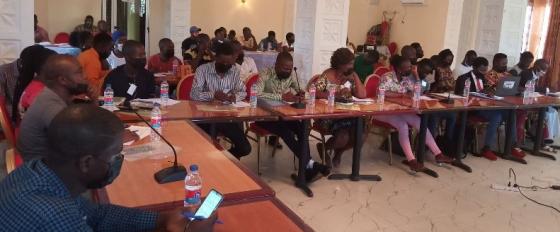Youths Engage Policy Makers, Concessionaires on Responsible Agriculture Investment

Young farmers in discussion with policy makers and concessionaires
A one day policy dialogue meeting on Responsible Agriculture Investment has ended in Monrovia with Liberian youths stressing the importance for policy makers and concessionaires to see reasons to ensure or implement those policies that are needed for the empowerment of young people engaged in agricultural and fisheries activities across the country.
The policy dialogue meeting, which was organized by Agro Tech, a youth driven organization, brought together more than 60 young people selected from the fifteen counties of Liberia with support from the Food and Agriculture organization (FAO).
It was attended by Margibi County Senator Jim W. Tornonlah, who is the Chair of the Committee on Agriculture, Fisheries and Forestry, Montserrado District Number One Representative Lawrence Morris, who is the Chair on agriculture in the House of Representatives, officials from some government ministries and agencies associated with agricultural issues, concessionaires and other stakeholders.
This policy dialogue meeting comes after a baseline assessment study being carried out by Agro Tech, which indicates that 55% of youth in agriculture do not have access to agricultural support and are not involved in decision-making processes at local and national levels on agricultural matters.
Speaking during the meeting, Senator Tornonlah alluded to the fact that young people need more support to improve their lives in the agricultural sector. He said that there are some programs and policies that the government has developed for young people in agriculture, but the implementation is something that needs to be taken seriously.
“I am very overwhelmed by the presence of young people from all over the country who have come to dialogue on issues that are meant to reshape the agriculture sector. I have had the thought that not many young people in this country want to use agriculture to improve their living conditions. This is truly a good sector that speaks of the issues of food and national security as without food our country cannot become peaceful,” he informed the youths attending the meeting.
Senator Tornonlah used the occasion to urge the young people to develop a vision for agriculture in order to contribute to the promotion of food and nutrition security.
He said that many young people over the years have acquired knowledge in agriculture, but have failed to utilize it.
“As you dialogue today, I want you to know that if you are passionate about this sector, it can shape your future as well as make the country food secure,” he stressed.
The Margibi senator said that with a few committed young people in the sector, the nation could achieve agricultural transformation.
He added that the young farmers should have themselves organized into cooperatives and work harder to produce more food.
“You do not have to wait to be employed but can start something that will transform your lives and families. Begin with the first steps by showing a high level of commitment toward your vision for farming,” he further urged the young people.
“Do not be deterred at the moment because you are lacking the necessary support. But with this vision you can be managers and employers to make the difference in this nation,” he added.
The Margibi County senator used the occasion to ask the youths to advocate for those changes they want to see in the sector.
Delivering the keynote address, a young agriculturist, CEO of Agro Lite – Kangoma M. Turay, lamented that despite the vast potential of the country’s agriculture, more young people are not matriculating in the sector, but seeking for white-collars jobs.
“Every day, we the youths of this country complain of lack of jobs on the radios when we as youths can create our own jobs by meaningfully participating in the agriculture activities,’’ he mentioned.
He stated that young people are the highest consumers of food and as such should not look up to the government to produce it for them.
“Many young people have acquired training in agriculture, but have failed to go back to the soil. This is something that we must work to overcome,” he added.
He stressed the need for the government to train more young people and empower them with resources.
Speaking earlier on behalf of the country representative of FAO Mariatou Njie, the Forestry and Natural Resources Management Consultant at FAO Florence Malorbah Dorley said the policy dialogue was intended to increase capacity, knowledge and participation of youths in agriculture sector policy dialogues, formulation and its implementation processes. Meanwhile, the youths are expected to derive a Communiqué from the dialogue that will petition the government to further create the enabling environment, where the young people can access more support for agriculture to improve their lives.
